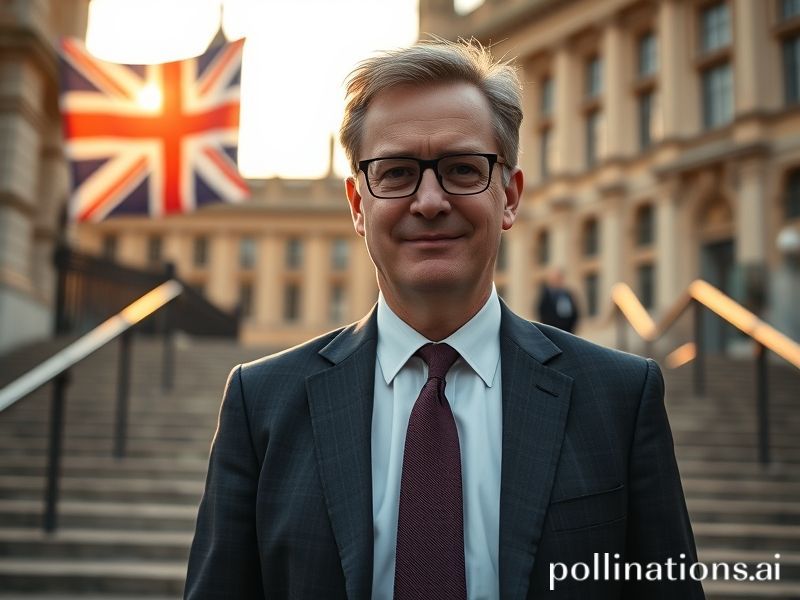Douglas Alexander Rises Again: How the World’s New Trade Minister Became the Liberal Order’s Favorite Boomerang
The Return of Douglas Alexander, or How the World Learns to Love a Political Boomerang
By Our Man in the Departures Lounge
If you blinked sometime last November, you might have missed the moment Douglas Alexander re-entered polite international society without so much as a security pat-down. One minute he was the invisible man of Gordon Brown’s Downing Street—an apparition in a rumpled suit muttering about “global economic coordination” while Lehman Brothers turned into confetti. The next, he’s the freshly minted UK Trade Minister, dispatched to charm sheikhs, CEOs, and whichever autocrat has a spare sovereign-wealth fund lying around. The global takeaway? In geopolitics, there is no statute of limitations on second chances—only a dress code.
Alexander’s resurrection arrives precisely when the liberal order needs a human palimpsest: someone who can quote both the Sermon on the Mount and the World Trade Organization’s dispute-settlement clause in the same breath. Brussels sees him as the adult in the room now that the adults have all resigned. Washington, still hung-over from the last administration’s tariff bender, regards him as a living LinkedIn endorsement for “rules-based trade.” Meanwhile Beijing, ever punctual, has already scheduled three back-to-back “friendship banquets” where the duck is Peking and the debt-trap is politely euphemized as “infrastructure partnership.”
From Nairobi boardrooms to Davos chalets, the Alexander reboot is being parsed like a holy text. Kenyan tech entrepreneurs want to know if he’ll reopen the tariff gates that Brexit slammed shut; Swiss pharmaceutical barons wonder if he remembers the discount code for NHS procurement. Even the Australians, who once mocked him as “that Scottish bloke who lost his seat to a 20-year-old,” now invite him to barbecue briefings where the shrimp are prawns and the geopolitics are grilled medium-rare.
The irony, of course, is that Alexander’s new remit—trade, investment, digital regulation—consists of policy areas he helped break the first time. As Europe Minister in 2005, he oversaw the Lisbon Treaty’s birth, a document now so routinely ignored it might as well be issued on bog roll. As Transport Secretary, he championed Heathrow’s third runway, a project still circling in holding-pattern purgatory like a budget airline with engine trouble. Yet the world has apparently decided that experience in prior disasters counts as a transferable skill. Think of it as hiring the captain of the Titanic to consult on iceberg avoidance—he’s literally seen the worst.
Alexander’s diplomatic style is already legend: part Presbyterian sermon, part late-capitalist TED talk. He’ll open a speech in Singapore quoting Adam Smith on moral sentiments, segue into a PowerPoint slide on lithium supply chains, and close with a prayer for the children of Gaza—delivered, naturally, in the tone of a man settling a council-tax dispute. Audiences leave vaguely inspired, slightly guilty, and no closer to understanding what they just agreed to.
Still, in an era when trade is weaponized faster than you can say “semiconductor sanctions,” a minister who can speak bureaucrat, banker, and bleeding-heart in the same paragraph is a rare commodity. The global South, weary of being lectured on democracy by countries that can’t keep their own parliaments open, finds Alexander refreshingly un-messianic. He offers them not freedom, but frictionless customs procedures—which, in 2024, passes for utopia.
So what does the Douglas Alexander revival tell us about the international order? Simply that entropy has a sense of humor. We recycle politicians the way we recycle plastics: imperfectly, often into something flimsier, but with a stubborn faith that it’s better than chucking them into the ocean. The planet warms, markets convulse, and yet the same faces reappear, slightly more weathered, still promising that this summit, this trade deal, this regulatory sandbox will be the one that finally balances the ledger.
And perhaps that’s the darkest joke of all: in a world careening from crisis to crisis, the most radical act is continuity. Douglas Alexander, once the future of New Labour, now its sepia-toned envoy, steps onto the world stage carrying nothing but a briefing folder and the weary optimism of a man who’s read the last page and decided to reread anyway. Somewhere, a customs officer stamps another passport, the global elite clink another glass, and the carousel keeps spinning—because the alternative, apparently, is admitting the ride is over.







